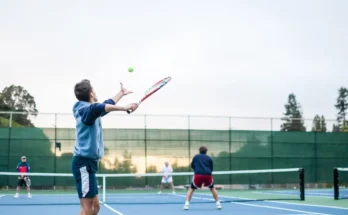From packed stadiums vibrating with chants to lone runners chasing sunrise, sports are more than competition—they’re an emotional language shared by the world. They transcend borders, cultures, and politics, uniting people through a common love for challenge, excellence, and spirit. Whether you’re cheering for your hometown team or marveling at a solo athlete’s journey, sports ignite something primal in us: the desire to strive, to win, to belong.
In the modern world, sports have grown into a multi-billion-dollar industry, but their essence remains rooted in something much deeper. They are about identity, dreams, struggle, and redemption. They teach us discipline and show us joy. They can break hearts—and build legacies.
The Origins and Evolution of Sports:
-
From Ancient Games to Global Phenomena
The roots of sports stretch back to the dawn of civilization. Ancient Egyptians played a form of hockey. Greeks brought us the Olympic Games, where honor was earned not through words, but feats of strength, speed, and strategy. Across continents, native cultures developed games that reflected their environments—lacrosse among Native Americans, polo in Persia, and martial arts across Asia.
As societies evolved, so did sports. Rules became formalized. Leagues and clubs were born. National pride was injected into every match. With the rise of the modern Olympics in 1896 and global competitions like the FIFA World Cup, sports moved from fields and arenas to the global stage.
-
The Media Boom and Modern-Day Madness
The 20th and 21st centuries saw sports undergo a dramatic transformation, thanks largely to media and technology. What was once only seen by a few hundred in a local stadium could now be witnessed by millions around the world in real time. Radio brought live commentary into living rooms. Television made athletes household names. The internet turned sports into 24/7 entertainment.
Social media has added yet another layer. Fans interact directly with players, debates rage online, and viral moments spread within seconds. Sports today are not just consumed—they’re experienced in real-time, through multiple lenses, from countless angles.
The Power of Sports in Society:
-
More Than a Game
Sports influence language, fashion, and even politics. They have the power to unite nations or spark debates that go far beyond the scoreboard. Think of the 1995 Rugby World Cup in South Africa, when Nelson Mandela used the tournament to help bridge racial divides. Or the Olympics, where nations set aside conflict for a few weeks of shared humanity.
Athletes, too, have stepped into roles beyond their sport. Muhammad Ali, Billie Jean King, Colin Kaepernick—these names resonate not just because of medals, but because of messages. Sports stars can become symbols of resistance, progress, and change.
-
Healing Through Competition
In times of crisis, sports often serve as a source of comfort and resilience. After 9/11, baseball games returned to packed crowds, offering a form of collective healing. During the COVID-19 pandemic, even empty stadiums held symbolic weight—reminding us that life, in some form, continues. That hope remains.
The Drama of the Game:
-
The Unscripted Theatre of Emotion
No Hollywood film can replicate the raw drama of sports. A last-second goal, an unexpected upset, a comeback from injury—these moments are unscripted, and that’s their power. We tune in because we don’t know what will happen. We invest emotionally, and sometimes irrationally, in teams or athletes we may never meet.
It’s about more than winning or losing. It’s about stories. The underdog rising. The champion defending. The veteran holding on. The rookie breaking through. These narratives captivate us because they mirror life—messy, unpredictable, beautiful.
-
Heroes, Villains, and Everyone In Between
Every sport produces its legends. Serena Williams, Lionel Messi, LeBron James, Usain Bolt—these are not just athletes; they’re icons. Their talent is unmatched, but it’s their journeys that truly inspire. The obstacles they’ve overcome, the way they carry pressure, the humility—or bravado—with which they perform, all add to their mythos.
Yet, sports also have their villains. The controversial players, the foul-mouthed managers, the floppers and cheaters. Love them or loathe them, they add to the color and conflict that makes sports addictive.
The Diversity of Sports Across the World:
-
Different Fields, Same Passion
While some sports enjoy global reach, like soccer or basketball, others remain deeply regional yet equally passionate. Cricket dominates South Asia. Baseball is sacred in Latin America and Japan. Ice hockey pulses through Canada and Northern Europe. Rugby holds court in New Zealand and South Africa.
Each sport carries its own traditions, fan cultures, and unwritten codes. The quiet politeness of golf differs dramatically from the raucous chants of a football terrace. Yet beneath it all is the same core: connection, pride, and love for the game.
-
The Rise of New and Alternative Sports
The world of sports is constantly evolving. Esports has taken center stage with millions tuning in to watch professional gamers. Skateboarding and surfing, once niche cultures, are now Olympic events. Even traditional practices like yoga and parkour have morphed into competitive or lifestyle sports with massive followings.
These changes reflect the broader shifts in society. Younger generations crave new forms of expression, new ways to compete and connect. Sports, as always, adapts.
The Business of Sports:
-
When Passion Meets Profit
Modern sports are not just emotional spectacles—they’re major business empires. Clubs are worth billions, athletes earn more through endorsements than salaries, and global brands pour money into sponsorships. Media rights deals shape how and where fans watch, and new technologies—from AI to blockchain—are redefining the sports economy.
Yet, this commercialization also brings challenges. Ticket prices rise, grassroots development suffers, and the line between sport and entertainment blurs. Critics argue that some of the purity is lost. But others see it as evolution—a way for sports to thrive in a digital, globalized world.
-
The Fan Economy
Fans today are not passive viewers—they are stakeholders. They buy jerseys, create content, travel across continents, and debate endlessly online. The fan economy fuels the entire sports ecosystem. Clubs and leagues have begun to listen more closely, offering interactive experiences, fan tokens, and even letting fans vote on certain decisions.
This shift marks a new chapter, where loyalty and passion are both emotional currency and business strategy.
The Future of Sports:
The next frontier for sports lies in innovation. Virtual reality may soon let fans sit courtside from their living rooms. Biometric sensors will track athlete performance and health in real time. Data analytics will reshape scouting, training, and in-game decisions.
Sports will become faster, smarter, and more immersive. But the challenge will be to retain the human soul of the game amid all the screens and algorithms.
Interestingly, as sports grow more high-tech and commercialized, there’s also a return to grassroots. Communities are investing in local leagues, schools are emphasizing physical education, and there’s growing awareness about mental health in athletes. The focus is shifting back to why we fell in love with sports in the first place—the joy of playing, the thrill of teamwork, the lessons in failure.
Conclusion:
In a world that often feels divided, sports remain one of the few universal languages. They remind us of our potential and our limitations. They give us heroes and heartbreaks. They teach us how to win with grace and lose with dignity. Whether you’re on the field, in the stands, or watching from halfway across the globe, the experience is shared. The emotions are real.
So the next time a match kicks off, remember: you’re not just watching a game. You’re witnessing a story, a legacy, a dream in motion. That’s the true magic of sports.




